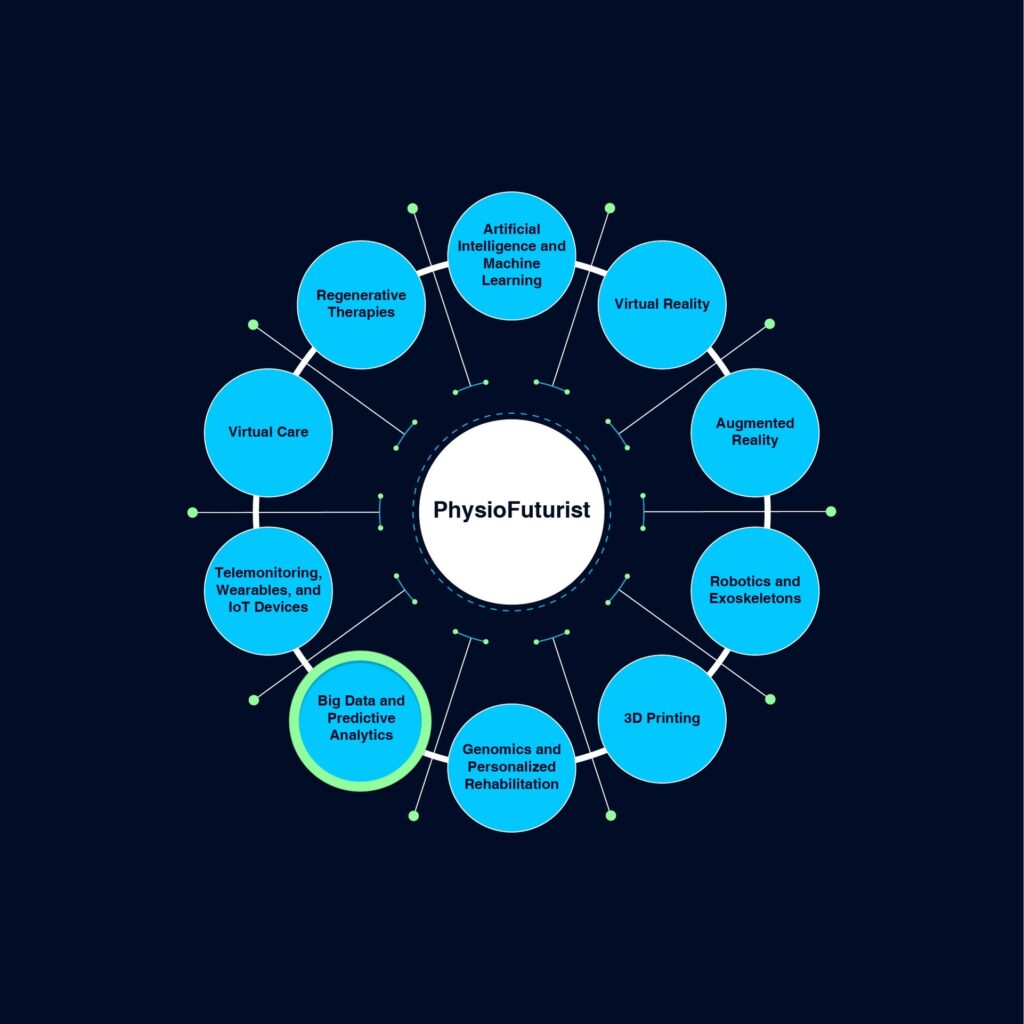This is the eighth guest post in a series written by Jason Giesbrecht – Physiopedia Plus Instructor, Senior Healthcare Leader and Physiotherapist.

We are immersed in an era of big data, where every action, click, and movement is a source of valuable information. This post explores how the convergence of Big Data and Predictive Analytics is revolutionizing physiotherapy, transforming patient care with insights previously beyond our reach.
The current state of play
While sectors like marketing and finance have rapidly integrated big data, healthcare, including physiotherapy, is just beginning to tap into its potential. Researchers are leveraging machine learning algorithms to distill insights from a wealth of patient data – electronic health records, wearable device outputs, genetic profiles, and more. This analysis can reveal essential information about risks, optimal treatments, and personalized care plans.
Early successes and transformative potential
We’re already seeing the fruits of big data in healthcare. Machine learning models are predicting hospital readmission risks for heart failure patients and identifying suitable clinical trials for patients. These successes demonstrate the transformative potential of data in physiotherapy:
- Accurate prognoses: Algorithms fed with substantial patient data can predict recovery trajectories, allowing therapists to create individualized treatment plans.
- Remote monitoring: Using data from wearable sensors, therapists can monitor key health indicators between appointments for timely interventions.
- Optimized exercise prescription: Data analysis can inform the design of personalized exercise programs, adapting intensity and difficulty based on ongoing monitoring.
Data as an asset in rehabilitation
In this ‘exponential age’, data is becoming a valuable asset, shaping the physical and virtual worlds. Its role in decision-making is growing, transitioning us to a world where we use knowledge to make informed decisions. In physiotherapy, this means harnessing data for precision and augmentation in patient care.
Personalized rehabilitation and real-time monitoring
Imagine a scenario where a physiotherapist uses data analytics to tailor rehabilitation for a patient recovering from a knee injury. By analyzing the patient’s movement patterns, pain levels, and recovery progress, the therapist can adjust the treatment plan in real-time, ensuring optimal recovery.
Similarly, consider a patient with chronic back pain. Wearable sensors track their posture and activity levels, providing data that informs the physiotherapist about the patient’s daily movement habits. This information enables the therapist to offer personalized advice and exercises, reducing the patient’s discomfort and improving their quality of life.
Navigating the challenges
Integrating these technologies into physiotherapy presents challenges: aligning predictive models with clinical expertise, addressing cost and accessibility, and increasing data literacy among therapists. Collaboration across disciplines is crucial for successful integration.
Ensuring empowerment, transparency, and trust
As algorithms become more integrated into healthcare, maintaining trust and transparency is critical. Patients need assurance about the secure and ethical use of their data. Communicating predictive analytics in an empowering way is essential, allowing patients to understand and participate actively in their rehabilitation journey.
Ethical considerations
In this data-driven landscape, physiotherapy faces ethical questions about equity, fairness, patient autonomy, and privacy. We must balance technological advancements with patient-centric care and protect sensitive patient data.
Envisioning the future
The future of physiotherapy, driven by Big Data and Predictive Analytics, holds the promise of more personalized, responsive, and optimized rehabilitation. Patients will experience care tailored to their unique recovery journeys.
Embracing a data-driven approach requires the collective effort of physiotherapists, patients, and policymakers. By integrating these technologies responsibly and creatively, we enter a new era of data-enhanced, insight-driven care, paving the way for more effective, empowering, and efficient patient-clinician partnerships. This is just the beginning of a journey towards a data-driven future in physiotherapy, where bespoke rehabilitation pathways and responsive interventions become the norm, promising a more efficient and empowering patient-clinician partnership.
Jason would love to hear your ideas on this topic, feel free to reach out to him at [email protected] to discuss the topic further; and you can follow him on Twitter and Instagram.